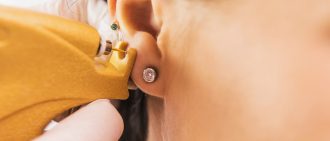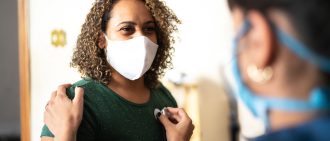If you have acne, chances are you may have heard that retinol is a good treatment. But you may wonder what, exactly, retinol is — and what it does.
Retinol and Acne
Retinol is a type of retinoid, or a group of drugs that come from vitamin A. Dermatologists have been prescribing retinoids to treat skin conditions since the early 1970s.
The first FDA-approved retinoid was tretinoin (Retin-A). Retin-A is a topical treatment, meaning that you put it on your skin instead of swallowing a pill. Dermatologists still prescribe it for acne.
For severe acne, doctors sometimes prescribe a much stronger retinoid called isotretinoin (Accutane). Accutane comes in pill form.
What’s the difference between a retinoid and retinol?
The term “retinoid” is an umbrella term for both over-the-counter (OTC) and prescription skin medications that come from vitamin A. Dermatologists use retinoids to treat psoriasis, some cancers, aging skin, and acne.
Retinol is an over-the-counter (OTC) topical retinoid. OTC retinol products have a lower concentration of the medicine than prescription retinoids. The OTC products contain up to 2% retinol.
If you need a stronger medication, doctors can prescribe retinoids in either pill or topical form.
How do you use retinol products?
OTC retinol comes in a variety of topical forms. This includes liquid serum, gels, creams, and emollients.
Dermatologists typically recommend applying retinol serum for acne after you wash your face at bedtime. You shouldn’t apply it before going out in the sun because it can increase skin damage from UV rays.
How does retinol work?
Retinol and other retinoids work by increasing cell turnover. That turnover works to exfoliate skin, minimizing the clogged pores and bacteria that lead to acne breakouts.
New Here - Living and Wellness
Should You Use Retinol if You Have Acne?
The American Academy of Dermatology says that skin products that contain retinoids are good for someone with acne. They advise starting with retinol, the lowest-strength product available.
If the OTC treatment doesn’t seem to have any effect on your skin, see a board-certified dermatologist. You may need a stronger, prescription-strength retinoid — or a different type of treatment.
How Long Does It Take for Retinol to Clear Acne?
Retinol does help clear acne, but it’s not a quick fix. It may take weeks or even a few months for your skin to improve. Plus, you may have an initial acne flare-up when you start using retinol.
That doesn’t mean the retinol serum for acne isn’t working. Rather, the medicine brings pimples to the surface as the cells turn over. Have patience and stick with the treatment protocol that the package directions — or your dermatologist — recommend.
Never Miss a Beat!
Subscribe to Our HealthBeat Newsletter!
Thank you for subscribing!
You can now select the specific newsletters you'd like to receive.
You are already subscribed.
Subscribe to more newsletters in our email preference center.
Sorry, an error occurred. Please try again later.
Get Healthy Tips Sent to Your Phone!
Acne Scars and Retinol
Retinol can help your skin heal from acne scars and minimize the appearance of pores by stimulating cell turnover. It also reduces inflammation around breakouts.
When You Shouldn’t Use Retinol
Although retinol is effective for many people, there are times when it’s not the best treatment for acne. You shouldn’t use retinol if:
- You have skin allergies.
- You have rosacea. If you have significant redness or flushing in your face, it’s better to use medications specifically designed to treat rosacea.
- You have dark skin that’s easily irritated. Irritation from retinol can trigger dark marks known as hyperpigmentation.
- You’re pregnant. You shouldn’t use retinoids (topical or oral) during pregnancy.
- You’re going out in the sun. Retinol makes your skin more sensitive to UV light, so applying it at bedtime is best. And always use sun protection outdoors, including a hat, sunscreen, and sun-protective clothing.
Side Effects of Retinol
Retinol serum for acne can produce some side effects. Your skin may become:
- Dry.
- Itchy.
- Flushed.
- Scaly.
- Discolored.
- Very sensitive to light.
- Swollen.
- Blistered.
If you notice any of these reactions to a retinol product, call your doctor. It’s a good idea to see a board-certified dermatologist when starting any new skin routine.
Sources
About Dermatology
The UPMC Department of Dermatology diagnoses, treats, and manages numerous hair, skin, and nail conditions and diseases. We care for common and uncommon conditions, and our treatments include both surgical and nonsurgical options. We operate several specialty centers for various conditions. The UPMC Cosmetic Surgery and Skin Health Center is a comprehensive dermatologic laser facility, offering a full range of cosmetic services and procedures. With UPMC Hillman Cancer Center, we offer a Skin Cancer Program that provides complete care from screenings, diagnosis, treatment, and beyond. Find a dermatology provider near you.












